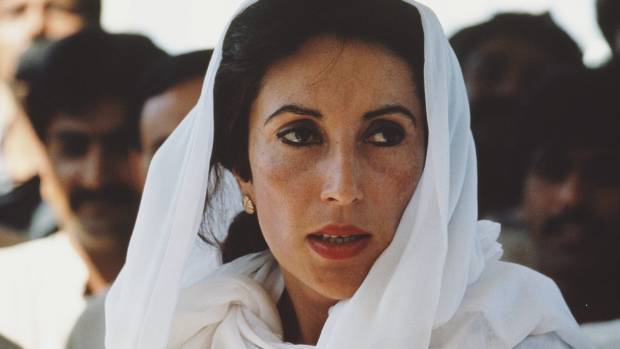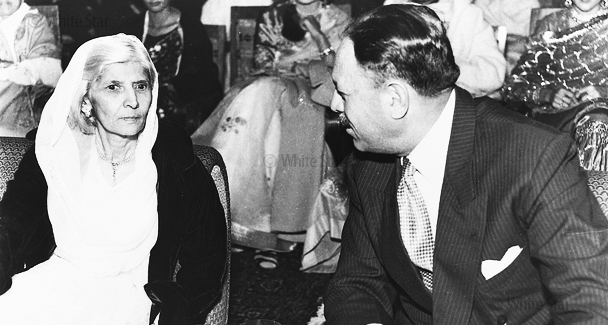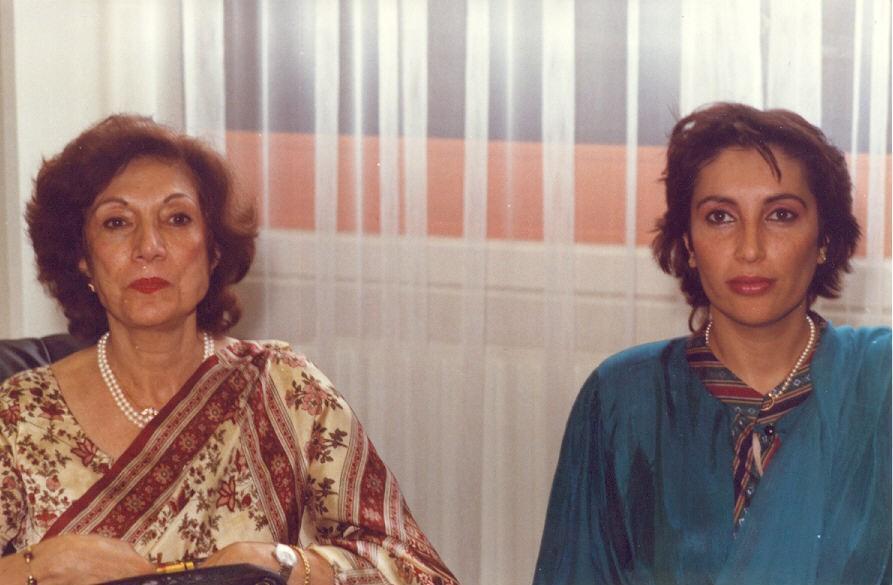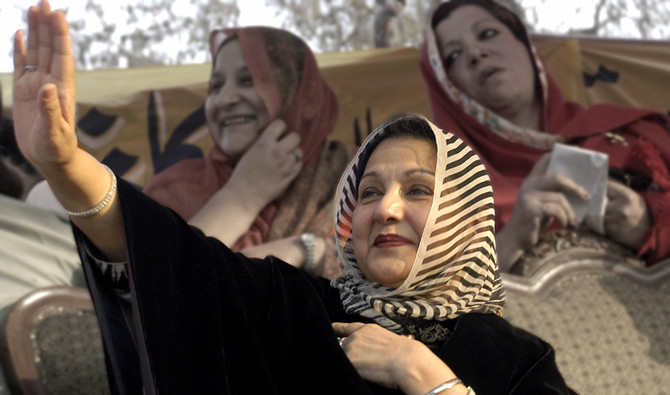
Pakistan has the history of dumping brave women, as the society instead of giving room to the progressive and competent women folks in all the fields of life, always creates hurdles for them. Women in politics are specifically targeted due to the male chauvinism and feudal politicking.
This humiliating trend of dumping brave women politicians started when Mohtarma Fatima Jinnah tried to play a pivotal role in the settlement of migrant women by establishing Pakistan’s Women Association after the independence in 1947.
The humiliation was reiterated by Pakistan’s first martial law administrator cum President Field Marshal Ayub Khan (a rank that existed in the army only during the Ayub era, 1958 to 1969) who decided to follow the presidential form of government through his own handpicked electoral college of basic democracies. He denied strengthening of the parliamentary system which was a dream the father of the nation wished to follow. Ayub, more interested in ruling and creating his names as the dictator suffocated the public for over a decade.

Mohtarma Fatima Jinnah toughly resisted the self proclaimed rule of General Ayub Khan, as the public saw her as the natural successor of their Qauid-e-Azam after his death in 1948. However, Ayub continued ruling Pakistan by manipulating the system. The 1965 presidential elections reflected the first turning point in the history of Pakistan, through the significant division of the poles in the east and west Pakistan. General Ayub Khan played dirty games to malign this stateswoman into controversies by forming and controlling the conventional Muslim League. The great Pakistani leader Zulfiqar Ali Bhutto (ZAB) sided with the dictator as the Secretary General of the League. The League and Ayub government used all sorts of negative tactics, including the political maneuverings and tampering of the election results to defeat Fatima Jinnah (as Bhutto separated from the League forming Pakistan Peoples Party, the semi-martial law government and the League used similar propaganda against Benazir Bhutto in 1988).
Anti-democracy forces made all sort of efforts to suppress the voice of Fatima Jinnah, even her speech on the death anniversary of Qauid-e-Azam was stopped from broadcasting by Radio Pakistan, writes Qudratullah Shahab in his book ‘Shahab-Nama’.
Ayub Khan even declared Fatima Jinnah an Indian and American agent, though he himself founded the Pak-US bond, and was a signatory to SEATO and CENTO defense pacts. Under the pacts, Ayub gave the Pakistani airbases (like Badaber near Peshawar) to USA for its spy crafts U-2 for use against the Union of Soviet Socialist Republics (USSR).
Fatima Jinnah, after the defeat in the presidential elections of 1965, confined herself to the walls of her residence in Karachi, knowing she was not allowed to work freely or address the nation. Yet, people thronged to offer her funeral prayers and to witness her burial at the tomb of Quaid-e-Azam in Karachi when she mysteriously died on 8th of July 1967. The whys and hows of her sudden death remain a mystery.
In the early 1970s, Nusrat Bhutto, the brave wife of the great leader Zulfiqar Ali Bhutto, emerged as Pakistan’s second significant woman politician. If I may say, she was an iron lady in Pakistan’s most difficult times – when Pakistan’s second dictator Zia-ul-Haq (a beneficiary who Bhutto himself had helped supersede several senior army officers) eliminated Zulfiqar Ali Bhutto from the political scene of the country by putting him behind the bars in a ‘concocted’ murder case.

Being the wife of the first elected Prime Minister and having political wisdom and love for the poor in her heart, Nusrat Bhutto always stood for Pakistani public and struggled for democracy in the country by fighting against the dictator on the streets and in courts of law.
The third most prominent woman politician of Pakistan was the undeterred Banazir Bhutto (Bibi Shaheed). She can be termed as the real iron lady of Pakistan as she fought the system and martial law like the Quaid’s sister Mohtarma Fatima Jinnah and her mother Begum Nusrat Bhutto. She never compromised with either General Zia ul-Haq or General Pervaiz Musharraf for the sake of democracy and betterment of the people of Pakistan.
Benazir Bhutto (BB) and her mother Nusrat Bhutto faced house arrests and they were sent to jail on several occasions by the military regime that feared mass protests under their leadership after the arrest of ZAB and proceedings against him as the principal accused.

Benazir Bhutto had no option except to leave the country in 1997 as the Nawaz government vigorously pursued the cases against her family that were registered by the caretaker government under President Farooq Ahmad Leghari, but she continued to work for the restoration of democracy from London and Dubai and later when Nawaz was also ousted in a coup by General Musharraf in 1999, she signed a Charter of Democracy with PML-N leader Nawaz Sharif in London on May 14, 2006. The charter aimed at ending the military rule from the country.
Seeing this development, General Musharraf advised her to avoid returning to Pakistan when she planned to return to the country to contest the elections in 2007. Musharraf wanted the re-election of the king’s party: Pakistan Muslim League – Quaid (PML-Q) group, but Bibi Shaheed rejected and resisted his plans and landed in Karachi on 18th of October 2007. She led a massive procession and her motorcade was attacked by a suicide bomber resulting in the death of over 200 people (mostly party workers and followers of PPP); however, this fearless woman continued on her journey and election campaign for keeping her party alive across the country. But the rulers never wanted her political role in this country. She came under repeated attacks until she was finally eliminated from the political scene through a suicide attack in Rawalpindi at the end of her speech at the Liaquat Bagh public meeting.
Ironically, Pakistan People’s Party won the elections in 2008 despite her murder and formed a democratic government that for the first time in the history of the country completed its five-year term under Bibi Shaheed’s Husband Asif Ali Zardari. The same also failed to arrest the murderer(s) of Benazir Bhutto, and the mystery of her death is still unresolved.
After Bibi, PML-N’s Kulsoom Nawaz became a wall against Musharraf when Nawaz Sharif government was dismissed in 1999 and he was arrested in the hijacking case along with Nawaz’s brother, and Punjab’s Chief Minister, Shehbaz Sharif.

Kulsoom came on the streets to save the political system and her family.
When she was diagnosed with throat cancer in 2017 as she was contesting the by-election after her husband Nawaz Sharif’s disqualification over Panama case by the Supreme Court of Pakistan, Chaudhry Aitezaz Ahsan and the anchor of a private television channel politicized Kulsoom’s sickness on social media. The so-called seasoned politician and anchor mocked, laughed and declared her illness a political scam to influence the 2018 elections, and not real.
The PM needs the sportsman’s spirit to take into account the struggles of women politicians from Fatima Jinnah to Kulsoom for democracy and human rights for Pakistani public. Struggles for guaranteeing human rights by Asma Jehangir, Sabeen Mehmud, Malala Yousufzai, Perveen Rehman and several others also cannot be ignored as they suffered for the cause of humanity and civil rights.
This humiliating trend of dumping brave women politicians started when Mohtarma Fatima Jinnah tried to play a pivotal role in the settlement of migrant women by establishing Pakistan’s Women Association after the independence in 1947.
The humiliation was reiterated by Pakistan’s first martial law administrator cum President Field Marshal Ayub Khan (a rank that existed in the army only during the Ayub era, 1958 to 1969) who decided to follow the presidential form of government through his own handpicked electoral college of basic democracies. He denied strengthening of the parliamentary system which was a dream the father of the nation wished to follow. Ayub, more interested in ruling and creating his names as the dictator suffocated the public for over a decade.

Mohtarma Fatima Jinnah toughly resisted the self proclaimed rule of General Ayub Khan, as the public saw her as the natural successor of their Qauid-e-Azam after his death in 1948. However, Ayub continued ruling Pakistan by manipulating the system. The 1965 presidential elections reflected the first turning point in the history of Pakistan, through the significant division of the poles in the east and west Pakistan. General Ayub Khan played dirty games to malign this stateswoman into controversies by forming and controlling the conventional Muslim League. The great Pakistani leader Zulfiqar Ali Bhutto (ZAB) sided with the dictator as the Secretary General of the League. The League and Ayub government used all sorts of negative tactics, including the political maneuverings and tampering of the election results to defeat Fatima Jinnah (as Bhutto separated from the League forming Pakistan Peoples Party, the semi-martial law government and the League used similar propaganda against Benazir Bhutto in 1988).
Anti-democracy forces made all sort of efforts to suppress the voice of Fatima Jinnah, even her speech on the death anniversary of Qauid-e-Azam was stopped from broadcasting by Radio Pakistan, writes Qudratullah Shahab in his book ‘Shahab-Nama’.
Ayub Khan even declared Fatima Jinnah an Indian and American agent, though he himself founded the Pak-US bond, and was a signatory to SEATO and CENTO defense pacts. Under the pacts, Ayub gave the Pakistani airbases (like Badaber near Peshawar) to USA for its spy crafts U-2 for use against the Union of Soviet Socialist Republics (USSR).
Fatima Jinnah, after the defeat in the presidential elections of 1965, confined herself to the walls of her residence in Karachi, knowing she was not allowed to work freely or address the nation. Yet, people thronged to offer her funeral prayers and to witness her burial at the tomb of Quaid-e-Azam in Karachi when she mysteriously died on 8th of July 1967. The whys and hows of her sudden death remain a mystery.
In the early 1970s, Nusrat Bhutto, the brave wife of the great leader Zulfiqar Ali Bhutto, emerged as Pakistan’s second significant woman politician. If I may say, she was an iron lady in Pakistan’s most difficult times – when Pakistan’s second dictator Zia-ul-Haq (a beneficiary who Bhutto himself had helped supersede several senior army officers) eliminated Zulfiqar Ali Bhutto from the political scene of the country by putting him behind the bars in a ‘concocted’ murder case.

Being the wife of the first elected Prime Minister and having political wisdom and love for the poor in her heart, Nusrat Bhutto always stood for Pakistani public and struggled for democracy in the country by fighting against the dictator on the streets and in courts of law.
The third most prominent woman politician of Pakistan was the undeterred Banazir Bhutto (Bibi Shaheed). She can be termed as the real iron lady of Pakistan as she fought the system and martial law like the Quaid’s sister Mohtarma Fatima Jinnah and her mother Begum Nusrat Bhutto. She never compromised with either General Zia ul-Haq or General Pervaiz Musharraf for the sake of democracy and betterment of the people of Pakistan.
Benazir Bhutto (BB) and her mother Nusrat Bhutto faced house arrests and they were sent to jail on several occasions by the military regime that feared mass protests under their leadership after the arrest of ZAB and proceedings against him as the principal accused.

Benazir Bhutto had no option except to leave the country in 1997 as the Nawaz government vigorously pursued the cases against her family that were registered by the caretaker government under President Farooq Ahmad Leghari, but she continued to work for the restoration of democracy from London and Dubai and later when Nawaz was also ousted in a coup by General Musharraf in 1999, she signed a Charter of Democracy with PML-N leader Nawaz Sharif in London on May 14, 2006. The charter aimed at ending the military rule from the country.
Seeing this development, General Musharraf advised her to avoid returning to Pakistan when she planned to return to the country to contest the elections in 2007. Musharraf wanted the re-election of the king’s party: Pakistan Muslim League – Quaid (PML-Q) group, but Bibi Shaheed rejected and resisted his plans and landed in Karachi on 18th of October 2007. She led a massive procession and her motorcade was attacked by a suicide bomber resulting in the death of over 200 people (mostly party workers and followers of PPP); however, this fearless woman continued on her journey and election campaign for keeping her party alive across the country. But the rulers never wanted her political role in this country. She came under repeated attacks until she was finally eliminated from the political scene through a suicide attack in Rawalpindi at the end of her speech at the Liaquat Bagh public meeting.
Ironically, Pakistan People’s Party won the elections in 2008 despite her murder and formed a democratic government that for the first time in the history of the country completed its five-year term under Bibi Shaheed’s Husband Asif Ali Zardari. The same also failed to arrest the murderer(s) of Benazir Bhutto, and the mystery of her death is still unresolved.
After Bibi, PML-N’s Kulsoom Nawaz became a wall against Musharraf when Nawaz Sharif government was dismissed in 1999 and he was arrested in the hijacking case along with Nawaz’s brother, and Punjab’s Chief Minister, Shehbaz Sharif.

Kulsoom came on the streets to save the political system and her family.
When she was diagnosed with throat cancer in 2017 as she was contesting the by-election after her husband Nawaz Sharif’s disqualification over Panama case by the Supreme Court of Pakistan, Chaudhry Aitezaz Ahsan and the anchor of a private television channel politicized Kulsoom’s sickness on social media. The so-called seasoned politician and anchor mocked, laughed and declared her illness a political scam to influence the 2018 elections, and not real.
The PM needs the sportsman’s spirit to take into account the struggles of women politicians from Fatima Jinnah to Kulsoom for democracy and human rights for Pakistani public. Struggles for guaranteeing human rights by Asma Jehangir, Sabeen Mehmud, Malala Yousufzai, Perveen Rehman and several others also cannot be ignored as they suffered for the cause of humanity and civil rights.
